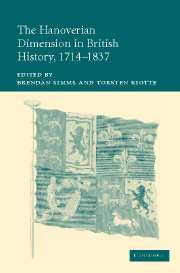Book contents
- Frontmatter
- Contents
- List of genealogical tables
- List of tables
- Notes on contributors
- Acknowledgements
- 1 Introduction. Hanover: the missing dimension
- 2 Hanoverian nexus: Walpole and the Electorate
- 3 Pitt and Hanover
- 4 George III and Hanover
- 5 The Hanoverian dimension in early nineteenth-century British politics
- 6 The end of the dynastic union, 1815–1837
- 7 The university of Göttingen and the Personal Union, 1737–1837
- 8 The confessional dimension
- 9 Hanover and the public sphere
- 10 Dynastic perspectives
- 11 British maritime strategy and Hanover 1714–1763
- 12 Hanover in mid-eighteenth-century Franco-British geopolitics
- 13 Hanover and British republicanism
- Index
2 - Hanoverian nexus: Walpole and the Electorate
Published online by Cambridge University Press: 13 July 2009
- Frontmatter
- Contents
- List of genealogical tables
- List of tables
- Notes on contributors
- Acknowledgements
- 1 Introduction. Hanover: the missing dimension
- 2 Hanoverian nexus: Walpole and the Electorate
- 3 Pitt and Hanover
- 4 George III and Hanover
- 5 The Hanoverian dimension in early nineteenth-century British politics
- 6 The end of the dynastic union, 1815–1837
- 7 The university of Göttingen and the Personal Union, 1737–1837
- 8 The confessional dimension
- 9 Hanover and the public sphere
- 10 Dynastic perspectives
- 11 British maritime strategy and Hanover 1714–1763
- 12 Hanover in mid-eighteenth-century Franco-British geopolitics
- 13 Hanover and British republicanism
- Index
Summary
Much of the problem in assessing the implications of the Hanoverian relationship comes from the tension between considering short periods and, on the other hand, assessing the relationship over the longer term. The former appears the most desirable approach, because it restricts coverage to a period for which it is simpler to carry out the necessary archival research. It is also flawed, however, both because it limits the experience of contemporaries and because it removes the comparative element, which is valuable for scholarly analysis, just as it was useful for contemporary debate about foreign policy. ‘Walpole and Hanover’ as a topic provides a good instance of this. While it focuses attention on the failure in existing treatments of Walpole to devote much attention to Hanover, this approach underrates the importance of considering Walpole at least in part in the light of developments after his fall from office in 1742. Not only did Walpole, from then 1st earl of Orford, maintain links with George II and also continue to influence the Pelham brothers until his death in 1745, but, in order to assess Walpole it is necessary to consider his policies in the light of the events of subsequent years as they provide a way of probing the alternatives. Hence this chapter closes in 1760.
- Type
- Chapter
- Information
- The Hanoverian Dimension in British History, 1714–1837 , pp. 10 - 27Publisher: Cambridge University PressPrint publication year: 2007
- 2
- Cited by



